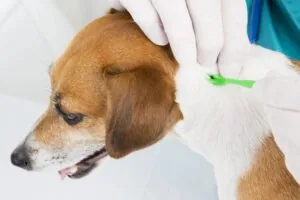Why is My Dog Vomiting? 10 Causes and What To Do
Are you suddenly asking yourself, “Why is my dog vomiting?” As a pet parent, seeing your furry friend in distress can be a heart-wrenching experience. At Shallowford Animal Hospital, we understand your concern and are here to shed light on 10 common causes of dog vomiting and what actions you should take.

Unraveling the Mystery: Why Do Dogs Vomit?
Like humans, dogs can vomit for a variety of reasons. It’s a natural response to remove harmful substances from their bodies. While occasional vomiting isn’t usually cause for alarm, chronic or severe vomiting could indicate a serious underlying issue that requires veterinary attention.
10 Common Reasons for Dog Vomiting
- Dietary Indiscretion: Dogs are curious by nature, often leading them to eat things they shouldn’t. This can upset their stomachs and result in vomiting.
- Food Intolerances or Allergies: Just like humans, dogs can be allergic or intolerant to certain foods, causing a reaction.
- Gastroenteritis: An inflammation or infection of the stomach or intestines, often resulting from consuming spoiled food or foreign objects.
- Parasites: Parasites in the gastrointestinal tract such as roundworms can cause a dog to vomit.
- Poisonous Substances: If a dog ingests a toxic substance, vomiting is often an immediate reaction.
- Bloat or Gastric Dilatation-Volvulus (GDV): A life-threatening condition where the dog’s stomach twists, cutting off blood supply.
- Pancreatitis: An inflammation of the pancreas, often linked to a high-fat diet or certain medications.
- Infectious Diseases: Conditions like parvovirus, leptospirosis, or bacterial infections can induce vomiting.
- Kidney or Liver Disease: These organ diseases often show early signs like vomiting, lethargy, and changes in drinking and urination habits.
- Canine Distemper: A viral illness that impacts various body systems, including the gastrointestinal tract.
What To Do When Your Dog is Vomiting
Firstly, don’t panic. Assess the situation calmly. If your dog vomits once but otherwise seems healthy, monitor their behavior. Provide fresh water to prevent dehydration and consider a temporary diet of bland, easily digestible food.
If your dog vomits repeatedly, or displays other signs of illness such as lethargy, diarrhea, loss of appetite, or behavioral changes, it’s time to seek professional help.
Why Timely Veterinary Care at Shallowford Animal Hospital is Essential
Here at Shallowford Animal Hospital in NC, we understand the worry when your furry friend is unwell. Our expert veterinarians are equipped to diagnose and treat a variety of conditions, ensuring your dog receives the best care possible.
Whether your pet’s vomiting is due to dietary indiscretion or something more serious like GDV or pancreatitis, we provide compassionate, comprehensive care. Our state-of-the-art facility utilizes advanced diagnostic tools to get to the root cause of your dog’s symptoms quickly, so treatment can begin immediately.
Remember, your dog’s health is not a place to cut corners or wait and see. Acting promptly can prevent unnecessary suffering and could even save your pet’s life.
To get your pet the help they need, call us at (336) 945-4412, or schedule an appointment online at https://connect.allydvm.com/practice/shallowford/appointment_request. You can also visit our website https://shallowfordvet.com/ for more information on our services.
Ensure your pet gets the care they deserve. After all, they aren’t just pets – they’re family.
Share This Post
Recent Posts
About Shallowford Animal Hospital
Shallowford Animal Hospital and The Pet Spa at Shallowford are dedicated to the exceptional, compassionate care your pet deserves. Pets hold a very special place in our families, and we treat yours like our own.



